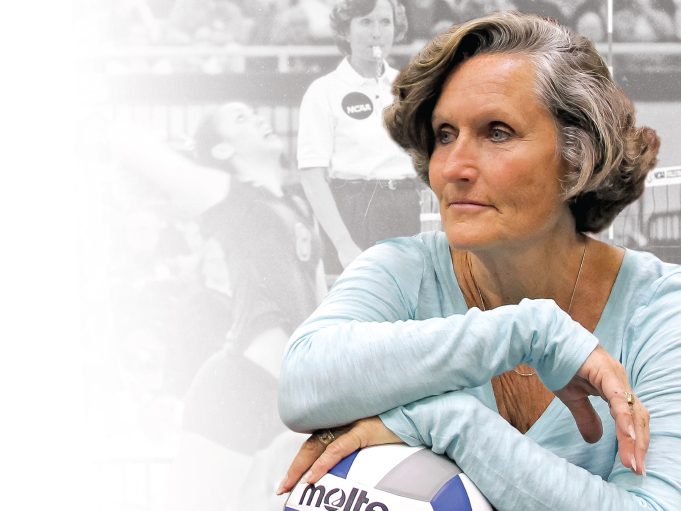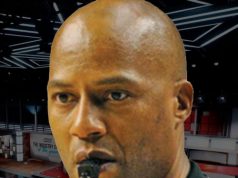Joan Powell sees the scene, and in it, she sees something more.
Volleyball courts, yes … they’re there, as far as the eye can see. Volleyball players are there, too. Everywhere. The scene bustles … all volleyball all the time — a beautiful thing to Powell, but the beauty matters less than the vision.
The vision is what matters, and before we go there, know this:
This story starts here, with one scene in a very big volleyball tournament, for a reason. A profile on women’s volleyball officiating’s most-dynamic, influential official — and Powell is all of that — is impossible to write without time spent on the industry’s future.
Where volleyball officiating is headed — specifically, how what’s good for the officiating industry can be good for the sport in general — is on Powell’s mind a lot these days, shaping much of what she’s about.
“I want to leave this job bigger and better,” she said.
Yes, the job, NCAA coordinator of volleyball officials. …
Powell’s the first person to hold it, and it has been hers since 2011, when the NCAA hired her to coordinate officials and launch its Volleyball Officiating Program. It’s a powerful job, befitting her status in the industry, yet to speak in terms of one title, or one role, doesn’t tell her story, or reflect her influence on the sport.
“She has an amazing ability, a pied-piper ability,” Marcia Alterman, executive director of the Professional Association of Volleyball Officials, said. “You find across the board in our sport people want to impress Joan Powell. They’ll work their tails off to do just that.”
How influential? How wide is her reach? She’s respected not only within her sport. …
“Dynamic and charismatic — that’s how you describe Joan Powell. And dedicated,” Alterman said. Susan True, former NFHS rulebook editor and rule interpreter, added, “The number one thing that describes Joan Powell is integrity.”
… but by influential types from other sports as well.
“A genuine, caring person,” Mike Pereira, former NFL vice president of officiating and current Fox Sports rules analyst, called Powell. “Every time I see her she just makes me smile.”
Powell’s career spans not just eras — she predates Title IX and has helped shape the sport since — but all three major roles you can play in her sport. Player. Coach. Official.
“She knows the game from every aspect — including a parent,” True said.
So, player, coach, official — and more, even. Powell’s four-and-a-half decade career is a story of personality, determination and accomplishment intertwining to shape, to influence. She’s in more Halls of Fame than one Google search can handle, and her biographies draw from all three areas. State championships as a high school coach, national championships as an amateur player — all while being an oncourt official of such respect that when the NCAA created her role … well, that’s how it felt. Like her role.
“She’s perfect for her position,” said Salima Rockwell, the Penn State associate head coach.
As for Powell, the pinnacle was never the goal. Not exactly.
“I always pictured myself in the rank and file,” she said.
It’s the rank and file that is on her mind a lot these days. Specifically who will make up the officiating rank and file moving forward. That’s why she’s returning to the court as an active official, working high school games this fall to mentor young officials.
And that’s where the scene at the beginning of the story comes in: a 170-court tournament that was chaos, bustle and all things an amateur volleyball tournament is about, but to Powell, was something potentially much bigger, too.
“I look at a 170-court tournament in Atlanta, Ga., and I look out and see, they’re all potential referees,” Powell said. “I say, ‘Why are we not getting these kids interested?’ I think it’s important for young females to get on the court and say, ‘Look at that gal.’’’
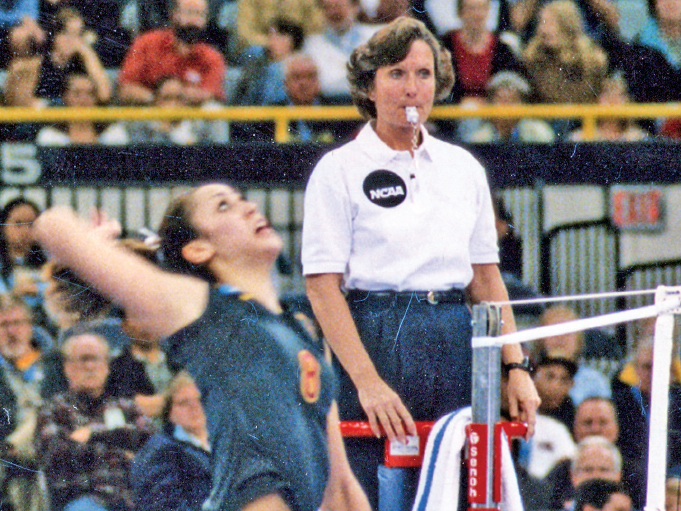
Something to know about Powell: This story wasn’t her idea. After 40 years as an oncourt official, she very much is an official at heart, and notoriety is not her way.
“I really don’t want people to know my name or that I officiated a match,” she said.
In that sense, True described Powell as what “an official ought to be … invisible except for having on that striped shirt,” and there are a couple of other things to know, too:
The lead anecdote to this story? The 170 courts? Not reality for women’s volleyball when Powell started. And a career in the sport? The hall-of-fame status that has come with it? Not even a sniff of imaginable — not to Powell and surely not to her parents.
“This was a matter of Joanie playing games,” she said of her beginnings, adding that her parents had another thought when it came to their daughter playing those games.
“When is that going to end?” she said, laughing.
Not that Powell started with a laser-focus on volleyball. She started high school wanting to be a cheerleader and kept wanting that. She tried out for cheerleading four years at Salpointe Catholic High School in Tucson, Ariz., and didn’t make it once.
“I was a slow learner,” she said, laughing.
But she was good at volleyball. Really good. Good enough to be MVP her senior year at Salpointe, then good enough to play at the University of Arizona, though there were no women’s volleyball scholarships there at the time. She was good enough, too, to help Arizona to the 1971 Association for Intercollegiate Athletics for Women national championships as a sophomore.
But that was pre-Title IX, and something else Arizona women’s volleyball didn’t have was a travel budget, which didn’t change when the athletics director went to the president for funds.
“There was no money,” Powell said. “We couldn’t go.” So no national championship for her Wildcat team, something that would be unheard of today.
If the girls on the 170 courts in Atlanta can’t imagine that world, that’s fine with Powell. She spent a career working to make the world of her sport different, and once volleyball took in Powell, it just fit, with its sense of team the most appealing aspect of all.
“You can’t be a ball-hog,” she said. “It was such an ultimate team sport that it just engulfed all of us to provoke that teamness. You can hide people in all sports, but it’s harder in volleyball.”
Powell played at Arizona from 1969-73, with her post-collegiate career featuring accomplishments in so many areas that you must break it into parts to make sense of it.
There was the player part, because she kept playing after Arizona and doing so at a high level, being named an USVBA Senior Division All-America selection from 1988-92 and playing on USVBA national championship teams in 1988, 1989 and 1991.
There, too, was the coaching part. She was head coach at Colorado Springs (Colo.) Palmer High School in 1975 before being head coach and a physical education/health teacher at Coronado High School in Colorado Springs from 1976-2006. She won state titles in Class 3A (1983), Class 4A (1988) and Class 5A (1992) at Coronado, and was named Coach of the Year seven times. She also was a 1989 Colorado Teacher/Coach of the Year nominee, as well as 1992 Disney Salutes Teacher of the Year national finalist — all while helping 30 players receive volleyball scholarships.
The athletic director who hired her at Coronado, Dick Powell, eventually became her husband. They’ve been married 31 years. He brought three kids from a previous marriage; she brought one, who of course, played for Joan in high school and went on to play in college.
And of course, there was the officiating part.
That began with a course at Arizona in officiating volleyball and field hockey, with her volleyball coach as her instructor. Powell had no interest in officiating field hockey; volleyball was different.
“I was enthralled with it,” she said. “I couldn’t get enough.”
She added with a laugh, “Thus, the launch.”
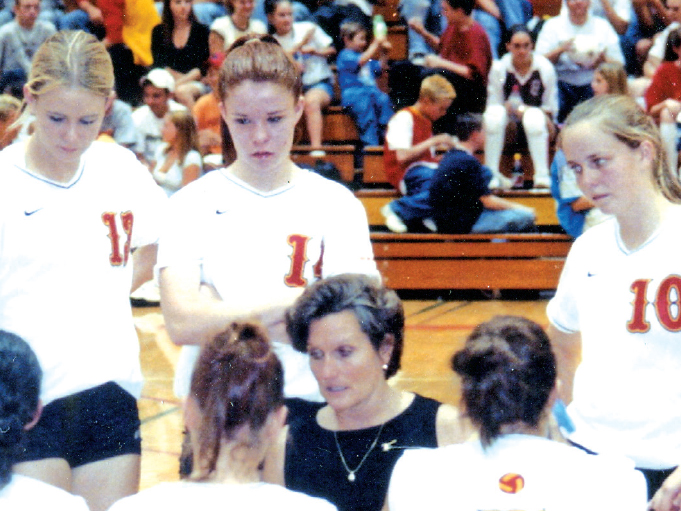
Thusly launched, Powell joined the local association. She started in Tucson working outdoor matches, nine on a side, officiating from an overturned garbage can in some games, from a cafeteria table in others. Her pay was $5 a game.
“I thought I was in heaven,” she said. “That’s how it all started.”
Once she started officiating, she never stopped. She not only has officiated NCAA championship finals on all three levels, as well as the U.S. Olympic Festival, she has served as Rocky Mountain Athletic Conference coordinator of officials and five terms as president of the Professional Association of Volleyball Officials (PAVO).
Penn State Head Coach Russ Rose, a six-time national champion and the winningest coach in NCAA history, called Powell “a breath of fresh air” who officiated for the right reasons.
“She comes into volleyball from every angle,” Rose said. “You’d like to think knowing the rule is the most important thing about officiating. A lot of people know the rules. But knowing that it’s a stressful environment, and knowing how to handle that and having the ability to stand by a decision, is just as important.
“She could look you in the eye after a call, good or bad. She knew how it was as a coach and she knew how it was an official. She knew how it was as a player. She always blended those things.”
Rose recalled a Powell-officiated national semifinal that started with close calls being argued by both sides. There was more than a little tension from game circumstance, as well as the stakes.
“Sometimes a match gets away from you early, and you don’t know how to grab it back,” Rose said. “We were having eye contact. She was looking at me with eyes like, ‘I know it’s a little crazy right now. Bear with me and we’ll get it back.’ She did. It’s experience that allows that to happen.”
And that helped the girl who started on top of an overturned trash can become an official wanted by coaches and players in the sport’s biggest matches.
“When you’d have her on the stand, we’d say, ‘She knows what she’s doing. Don’t worry about the officiating. Just play the game,’’’ Rose said.
Another thing to know about Powell: She doesn’t consider herself a trailblazer.
Yes, she wants girls to work in the sport after they play, and yes, that would be good for the sport and the girls. And yes, she watched the sport grow from pre-Title IX to where it is now. But while she blazed trails as blazing was needed, she said she never imagined being held up as a leader in women’s sports, and it didn’t fit her self-concept even after she received the 1989 Women’s Sports Foundation Award for dedication to women’s sports.
“I’m not a bra burner,” she said. “I thought the people before me were the pioneers.”
Neither did she expect the Hall of Fame stuff, though she’s in the halls of Colorado Springs, the Colorado High School Activities Association, Pima County Sports, University of Arizona Sports and the Colorado Volleyball Officials Association.
But when you do something well long enough, honors happen — as do opportunities to shape and influence. That was the case in 2011 when the NCAA approached Powell about becoming the inaugural national coordinator of officials, a role in which she also would serve as primary administrator of the newly formed NCAA Volleyball Officiating Program.
“It seemed like a natural position and a position that made sense,” said Rockwell, a member of the NCAA Volleyball Rules Committee. “She’s someone who always has been super-engaged and been around for so long that you would want her in charge. That’s exactly her. She has really good vision and she listens.”
If her NCAA role has meant power and influence, those who work with her on various levels will tell you it hasn’t changed Powell’s approach, and will tell you at the same time, Powell is an ideal choice as a leader, and shaper of policy.
“It’s easy to take a little shortcut or do something along the path of least resistance,” Alterman said. “Joan just doesn’t do that. To have someone with her kind of principles, someone who sets the bar that high in the officiating world, really makes her pretty indispensable.”
Powell, 62, has worked in the most high-profile of perches, serving on the USA Volleyball Board of Directors, as well as the NASO Board of Directors. She traveled in 2008 with the Women’s National Team as team leader to the Pan Am Cup, the World Grand Prix and to the Olympic Games in Beijing. Yet Pereira said Powell “never seems to attach any significance to what she has done.
“Every time she addresses somebody, she is so humble,” said Pereira, who met Powell through officiating conferences in the late 1980s. “Whether it’s a friend in a non-officiating conversation or an official in an officiating conversation, she wants to make that person grow and she wants to find out about that person.
“When you see her interact with people — whether it’s in a private meeting or a national meeting — she’s incredible in the way she comes across to people and teaches people.”
Pereira said many officials at the national level approach their roles without energy or a personal touch. Often, he said, you can feel the tension of their jobs in their conversation.
“You don’t feel that with Joan,” he said. “You feel this good heart, this good energy, this caring that comes from her that’s really truly about making people better. In this business there are people who have reputations that are reputations and you’re not necessarily drawn to them to learn. Joan, you’re drawn to immediately.
“She’s always on. She never seems to be off. She never seems to be affected by something negative.”
And if success as a coach and a player helped as an oncourt official, success in all three phases — coach, player, official — as well as a career’s worth of commitment to the entire sport has given Powell what Alterman called “amazing credibility” in her role with the NCAA.
“She does amazing things for not only volleyball officials, but coaches,” Alterman said. “She’s nearly as involved with coaching education as she is with officiating education. She’s an extremely principled person, and that’s good for officials.”
Alterman said despite her status, Powell listens as much as she speaks.
“She loves being around people who are in our profession,”Alterman said. “She likes to be a sponge, so she isn’t always the one doing the talking, the one doing the leading. Often, she’s just absorbing some other folks. Then, she’ll process that and come out with a really great result.
“Even when she has to be a little bit of a hammer, people never seem to walk away feeling like they’ve been hammered. They walk away feeling like they’ve been assisted. She has taken her own life experiences and learned from those and is intent on applying those to the profession of officiating.
“By doing that, she gets her return — by helping others be better and helping the sport be better.”
One more thing about Powell: Those times she has to be the hammer? When it’s up to her to do what must be done? Once those times come around … well, let’s just say she has the courage of her convictions.
“She has no fear,” Pereira said. “She will jump right up and engage in any conversation. When she hears something where she believes she might have something to offer, zoom — right out of her chair, and she’s into the conversation. She doesn’t care that she’s interrupting.”
Alterman told a story of being with Powell at a recent tournament. Toward the end of a long day, and without prompting, Alterman said Powell approached each team’s huddle and did a “rah-rah” talk, encouraging the girls to get involved with the sport as a coach, a referee, something.
The speech wasn’t planned. They hadn’t discussed it, Alterman said.
“She just does that sort of thing,” Alterman said. “It was a great speech. I sat there amazed and smiling. She’s as sincere as they come. It comes across. Even when she’s in front of a group talking to 300 officials, I guarantee most of them feel like she’s talking just to them. That comes from applying her own path, her own life lessons.
“She just thought, ‘There are a bunch of kids I can talk to right now and hook them.’’’
Getting those ex-players involved, Powell said, is crucial for the sport on a basic level. If she was a better official for having played, wouldn’t other ex-players be better officials, too? If officials were better, then wouldn’t the whole sport follow?
Powell told a story of seeing a situation develop while observing a recent match. The second referee was calling net faults more than usual. The captain on one team was getting cranky with the referee.
Powell saw the captain turn to the middle hitter.
“I knew she was telling her, ‘You bury it,’ because she was mad and going to prove a point,” Powell said. “That’s what happens when you play. You get competitive and you get mad and you rely on what got you there, which is a ‘We’ll-show-you kind of thing.’ Sure enough, she dishes to this gal, the gal buries the ball and the captain turns and points at the second referee and says, ‘That’s for you.’ He never anticipated it and never saw it until I showed him on tape.”
Powell said experience can help alleviate such situations.
“You can curb that behavior with assuredness when you make the call, whether it’s with a signal, or a whistle,” she said. “I guess that credibility and believability kind of came with me. Not saying I haven’t been yelled at by the best, but I like the role of a peacemaker rather than a police officer.”
Powell said she understands her vision of the future is a difficult one. Keeping girls in the sport long-term is tricky because of all the stuff that kids want to do other than officiating volleyball. But even with the obstacles and pitfalls — motherhood, getting yelled at by coaches …
“They’ve been yelled at by the best coaches in club, high school and college all their lives,” she said, laughing. “That shouldn’t be a problem. They have great passion for the game. There are a number of reasons why not, but we have to have good role models for the young gals to go, ‘OK, I see more women officiating.’ That’s OK.”
When Powell talks about leaving her position bigger and better, that’s part of it, and that’s part of the vision that Alterman said has been helping to shape and drive volleyball for an awfully long time. It’s also why part of Alterman worries about a future without Powell.
“I don’t know of anybody who has that same dynamic personality to make people want to do the right thing,” Alterman said. “That’s her greatest asset. She makes the majority of people want to do the right thing.”
Powell brushes off such concern. The sport is strong, she said, and will carry on with her or without her, even though True said, “I’m not sure there are a lot more like her.”
Will there be another Powell? Perhaps, but while the sport Powell so loves — like any sport — will surely carry on in that day in the future when Powell steps away, it certainly won’t be the same, either.
For now, however, she’s doing anything but stepping away. She’s planning on working high school matches this upcoming season, serving as a mentor to up-and-coming officials.
The officials — and coaches — she interacts with will be better for the opportunity to see her passion for the game and the people who participate in it.
“I’m sure the future will be fine,” Rockwell said, “but it’s nice to have her now. That’s for sure.”
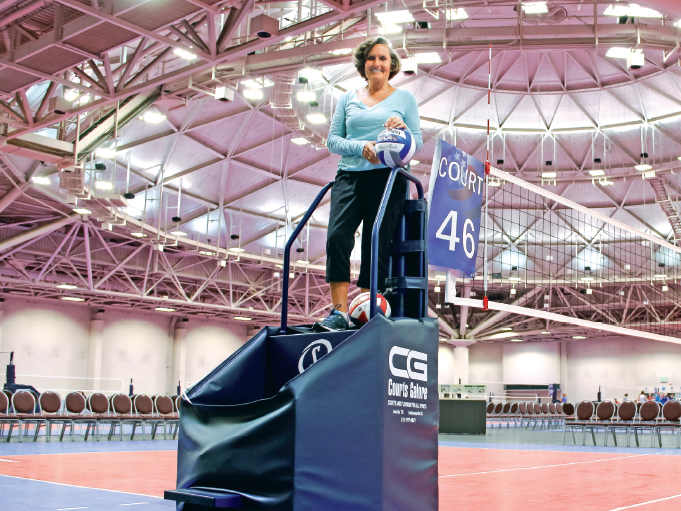
What's Your Call? Leave a Comment:
Note: This article is archival in nature. Rules, interpretations, mechanics, philosophies and other information may or may not be correct for the current year.
This article is the copyright of ©Referee Enterprises, Inc., and may not be republished in whole or in part online, in print or in any capacity without expressed written permission from Referee. The article is made available for educational use by individuals.

